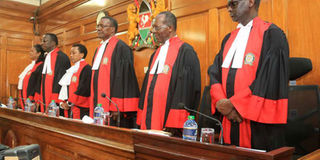Give Presidency more power and tame Judiciary

Supreme Court judges from left: Njoki Ndung'u, Smokin Wanjala, Philomena Mwilu, David Maraga, Jackton Ojwang', and Isaac Lenaola prepare to hear the presidential election petition at the Supreme Court on September 1, 2017. PHOTO | JEFF ANGOTE | NATION MEDIA GROUP
What you need to know:
- Kenya is endowed with great people, processes and systems that actually work.
- Recent court rulings are a clear indication that the custodian of law and order needs serious reforms.
- Of the three arms of government, only the Judiciary does not get mandate from the people of Kenya directly.
"No technicality, no conference, no process, no power or influence should ever stand in the way of that sovereign will.” This is an excerpt from President Uhuru Kenyatta’s speech during the inaugural joint session of the 12th Parliament. He was referring to the sovereign will of the people of Kenya, either directly or through their elected leaders.
Kenya is endowed with great people, processes and systems that actually work. This cannot be said of other African countries.
We have three arms of government that are supposed to work in a complimentary manner. The essence of the Judiciary, and indeed the rule of law, dates way back, when human beings were scattered in small groupings. With time, the groups became bigger and co-existence required some order.
The only fear then was attack from bigger groups. In their wisdom, people decided to choose one of their own to protect them. Enter the warriors.
WARRIORS
With time, the same people who chose the warriors started getting jittery and sympathised with their enemies who were injured or killed by the warriors. In fact, some hated their own leaders for being too strong.
The people decided to change, and came up with sets of laws to govern them. They then came up with the custodians of these laws, who were also mandated to implement and enforce the set of laws. This worked well, until the people safeguarding the laws started breaking them with impunity. This, too, didn’t last for long.
The Kenyan Judiciary has degenerated into a monster that is consuming the very fabric that holds us together. Recent court rulings are a clear indication that the custodian of law and order needs serious reforms. We have seen some judgments that have gone far from safeguarding public interest and general good — the primary responsibility of a Judiciary.
PARLIAMENT
Of the three arms of government, only the Judiciary does not get mandate from the people of Kenya directly. The Executive gets its legitimacy from the President and his Deputy, who get their mandate directly from the citizens. Parliament is the face of Kenya as the people have the ultimate say on who represents them. People have a chance to affirm or change elected leaders every five years. This does not happen in our Judiciary.
In the current dispensation, we elect the President and expect him to deliver to our expectations. We expect the President to make sure we are safe, well fed, well educated, that our infrastructure is good and much more. But we expect the President to shoulder responsibility without matching privileges.
FIGHT CORRUPTION
How do we expect the President, for example, to fight corruption when we make the process of punishing those who are corrupt so complicated and open-ended? The courts can overturn almost every single measure from the Executive.
We have abused our institutions and is high time we added value to them through reforms.
We should, at the same time, enhance the powers of the Presidency. Choosing our security bosses, Supreme Court judges, top officials of commissions and other such influential persons should be the prerogative of the President. Furthermore, no legacy of any country is based on such officers. The buck stops with the President and he should get all the instruments to discharge his responsibilities.
The writer is the MP for Kiharu and an economist




